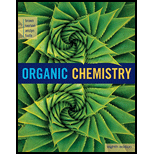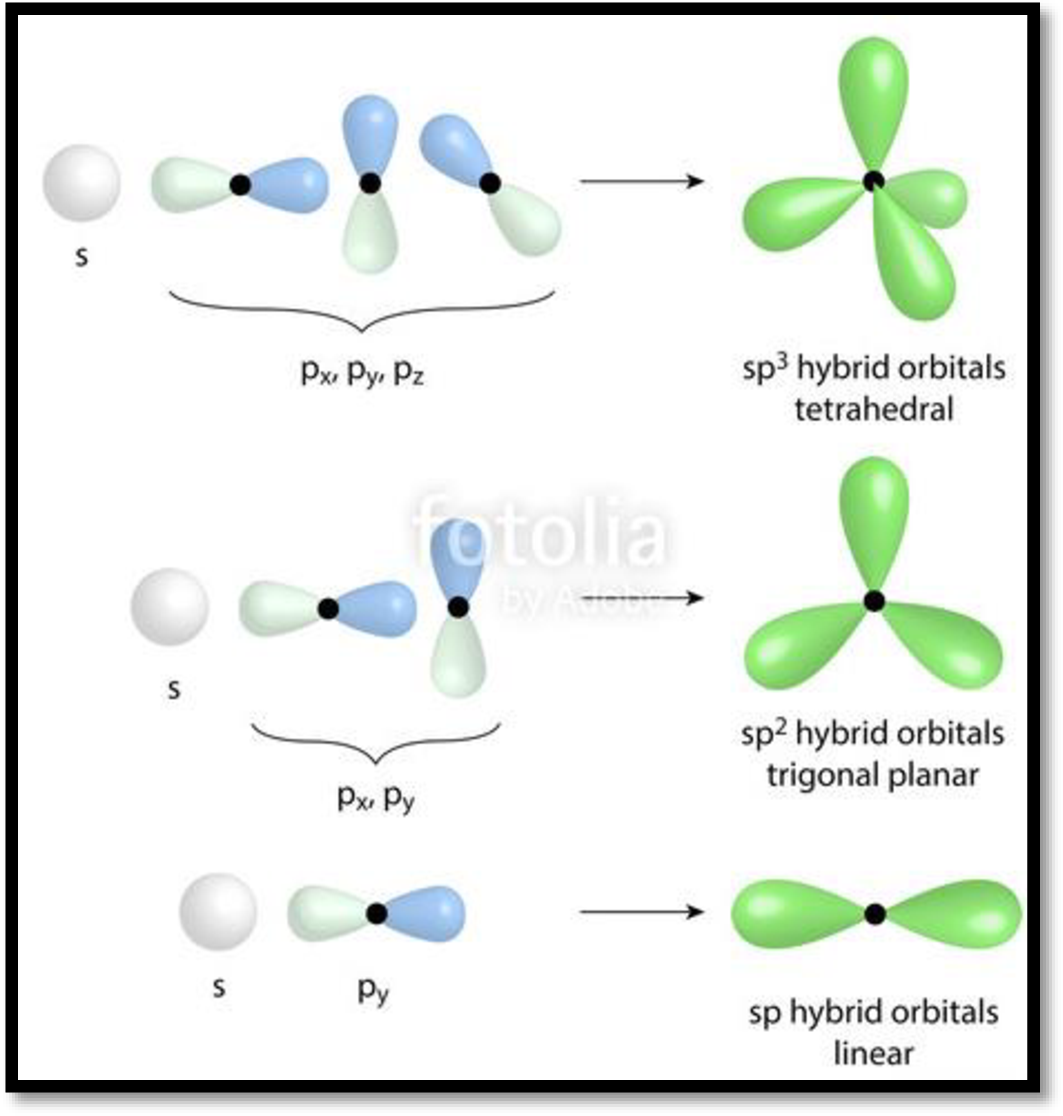
Organic Chemistry
8th Edition
ISBN: 9781305580350
Author: William H. Brown, Brent L. Iverson, Eric Anslyn, Christopher S. Foote
Publisher: Cengage Learning
expand_more
expand_more
format_list_bulleted
Concept explainers
Question
Chapter 2.6, Problem CQ
Interpretation Introduction
Interpretation:
The hybridization of the nitrogen atom within the ring and the nitrogen atom protruding from the ring has to be given.
Concept Introduction:
Hybridization:
When two atomic orbitals of equal energy mix together, it gives rise to two new hybridized orbitals of degenerated energy. This process is called Hybridization. Depending on the type of orbitals involved in mixing, hybridization is classified as

Figure 1
Expert Solution & Answer
Want to see the full answer?
Check out a sample textbook solution
Students have asked these similar questions
Please help me Please use https://app.molview.com/ to draw this. I tried, but I couldn't figure out how to do it.
Propose a synthesis of 1-butanamine from the following:
(a) a chloroalkane of three carbons
(b) a chloroalkane of four carbons
Select the stronger base from each pair of compounds.
(a) H₂CNH₂ or EtzN
(b)
CI
or
NH2
NH2
(c)
.Q
or EtzN
(d)
or
(e)
N
or
(f)
H
or
H
Chapter 2 Solutions
Organic Chemistry
Ch. 2.2 - Do the line-angle formulas in each pair represent...Ch. 2.2 - Draw line-angle formulas for the three...Ch. 2.3 - Write IUPAC names for these alkanes.Ch. 2.4 - Combine the proper prefix, infix, and suffix and...Ch. 2.4 - Write the molecular formula, IUPAC name, and...Ch. 2.4 - Write molecular formulas for each bicycloalkane,...Ch. 2.4 - Prob. 2.7PCh. 2.5 - For 1,2-dichloroethane: (a) Draw Newman...Ch. 2.5 - Following is a chair conformation of cyclohexane...Ch. 2.5 - Draw the alternative chair conformation for the...
Ch. 2.5 - Draw a chair conformation of...Ch. 2.6 - Which cycloalkanes show cis, trans isomerism? For...Ch. 2.6 - Following is a planar hexagon representation for...Ch. 2.6 - Here is one cis,trans isomer of...Ch. 2.6 - Prob. AQCh. 2.6 - Prob. BQCh. 2.6 - Prob. CQCh. 2.7 - Arrange the alkanes in each set in order of...Ch. 2 - Write a line-angle formula for each condensed...Ch. 2 - Write the molecular formula of each alkane.Ch. 2 - Using parentheses and subscripts, provide an even...Ch. 2 - Which statements are true about constitutional...Ch. 2 - Prob. 2.20PCh. 2 - Each member of the following set of compounds is...Ch. 2 - Each of the following compounds is an amine...Ch. 2 - Each of the following compounds is either an...Ch. 2 - Draw structural formulas and write IUPAC names for...Ch. 2 - Draw structural formulas for all of the following....Ch. 2 - Write IUPAC names for these alkanes and...Ch. 2 - Write structural formulas and line-angle formulas...Ch. 2 - Explain why each is an incorrect IUPAC name and...Ch. 2 - For each IUPAC name, draw the corresponding...Ch. 2 - Write the IUPAC name for each compound.Ch. 2 - Prob. 2.31PCh. 2 - Torsional strain resulting from eclipsed CH bonds...Ch. 2 - How many different staggered conformations are...Ch. 2 - Consider 1-bromopropane, CH3CH2CH2Br. (a) Draw a...Ch. 2 - Consider 1-bromo-2-methylpropane and draw the...Ch. 2 - trans-1,4-Di-tert-butylcyclohexane exists in a...Ch. 2 - From studies of the dipole moment of...Ch. 2 - Prob. 2.38PCh. 2 - Following are the alternative chair conformations...Ch. 2 - Prob. 2.40PCh. 2 - Prob. 2.41PCh. 2 - Draw line-angle formulas for the cis and trans...Ch. 2 - Name and draw structural formulas for all...Ch. 2 - Using a planar pentagon representation for the...Ch. 2 - Gibbs free energy differences between...Ch. 2 - Prob. 2.46PCh. 2 - Calculate the difference in Gibbs free energy in...Ch. 2 - Draw the alternative chair conformations for the...Ch. 2 - Use your answers from Problem 2.48 to complete the...Ch. 2 - There are four cis,trans isomers of...Ch. 2 - Draw alternative chair conformations for each...Ch. 2 - 1,2,3,4,5,6-Hexachlorocyclohexane shows cis,trans...Ch. 2 - Prob. 2.53PCh. 2 - What generalization can you make about the...Ch. 2 - What unbranched alkane has about the same boiling...Ch. 2 - Complete and balance the following combustion...Ch. 2 - Following are heats of combustion per mole for...Ch. 2 - Following are structural formulas and heats of...Ch. 2 - Without consulting tables, arrange these compounds...Ch. 2 - Which would you predict to have the larger (more...Ch. 2 - Following are structural formulas for 1,4-dioxane...Ch. 2 - Following is a planar hexagon representation of...Ch. 2 - On the left is a stereorepresentation of glucose...Ch. 2 - Prob. 2.64PCh. 2 - Prob. 2.65P
Knowledge Booster
Learn more about
Need a deep-dive on the concept behind this application? Look no further. Learn more about this topic, chemistry and related others by exploring similar questions and additional content below.Similar questions
- 4. Provide a clear arrow-pushing mechanism for each of the following reactions. Do not skip proton transfers, do not combine steps, and make sure your arrows are clear enough to be interpreted without ambiguity. a. 2. 1. LDA 3. H3O+ HOarrow_forwardb. H3C CH3 H3O+ ✓ H OHarrow_forward2. Provide reagents/conditions to accomplish the following syntheses. More than one step is required in some cases. a. CH3arrow_forward
- Identify and provide an explanation that distinguishes a qualitative and quantitative chemical analysis. Provide examples.arrow_forwardIdentify and provide an explanation of the operational principles behind a Atomic Absorption Spectrometer (AAS). List the steps involved.arrow_forwardInstructions: Complete the questions in the space provided. Show all your work 1. You are trying to determine the rate law expression for a reaction that you are completing at 25°C. You measure the initial reaction rate and the starting concentrations of the reactions for 4 trials. BrO³¯ (aq) + 5Br¯ (aq) + 6H* (aq) → 3Br₂ (l) + 3H2O (l) Initial rate Trial [BrO3] [H*] [Br] (mol/L) (mol/L) | (mol/L) (mol/L.s) 1 0.10 0.10 0.10 8.0 2 0.20 0.10 0.10 16 3 0.10 0.20 0.10 16 4 0.10 0.10 0.20 32 a. Based on the above data what is the rate law expression? b. Solve for the value of k (make sure to include proper units) 2. The proposed reaction mechanism is as follows: i. ii. BrО¸¯ (aq) + H+ (aq) → HBrO3 (aq) HBrO³ (aq) + H* (aq) → H₂BrO3* (aq) iii. H₂BrO³* (aq) + Br¯ (aq) → Br₂O₂ (aq) + H2O (l) [Fast] [Medium] [Slow] iv. Br₂O₂ (aq) + 4H*(aq) + 4Br(aq) → 3Br₂ (l) + H2O (l) [Fast] Evaluate the validity of this proposed reaction. Justify your answer.arrow_forward
- a. H3C CH3 H, 1.0 equiv. Br2arrow_forwardH3C. H3C CH 3 CH 3 CH3 1. LDA 2. PhSeCl 3. H2O2arrow_forwardPlease predict the products for each of the following reactions: 1.03 2. H₂O NaNH, 1. n-BuLi 2. Mel A H₂ 10 9 0 H2SO4, H₂O HgSO4 Pd or Pt (catalyst) B 9 2 n-BuLi ♡ D2 (deuterium) Lindlar's Catalyst 1. NaNH2 2. EtBr Na, ND3 (deuterium) 2. H₂O2, NaOH 1. (Sia)2BH с Darrow_forward
arrow_back_ios
SEE MORE QUESTIONS
arrow_forward_ios
Recommended textbooks for you
 Organic ChemistryChemistryISBN:9781305580350Author:William H. Brown, Brent L. Iverson, Eric Anslyn, Christopher S. FootePublisher:Cengage Learning
Organic ChemistryChemistryISBN:9781305580350Author:William H. Brown, Brent L. Iverson, Eric Anslyn, Christopher S. FootePublisher:Cengage Learning Organic Chemistry: A Guided InquiryChemistryISBN:9780618974122Author:Andrei StraumanisPublisher:Cengage Learning
Organic Chemistry: A Guided InquiryChemistryISBN:9780618974122Author:Andrei StraumanisPublisher:Cengage Learning
 Macroscale and Microscale Organic ExperimentsChemistryISBN:9781305577190Author:Kenneth L. Williamson, Katherine M. MastersPublisher:Brooks Cole
Macroscale and Microscale Organic ExperimentsChemistryISBN:9781305577190Author:Kenneth L. Williamson, Katherine M. MastersPublisher:Brooks Cole

Organic Chemistry
Chemistry
ISBN:9781305580350
Author:William H. Brown, Brent L. Iverson, Eric Anslyn, Christopher S. Foote
Publisher:Cengage Learning

Organic Chemistry: A Guided Inquiry
Chemistry
ISBN:9780618974122
Author:Andrei Straumanis
Publisher:Cengage Learning


Macroscale and Microscale Organic Experiments
Chemistry
ISBN:9781305577190
Author:Kenneth L. Williamson, Katherine M. Masters
Publisher:Brooks Cole